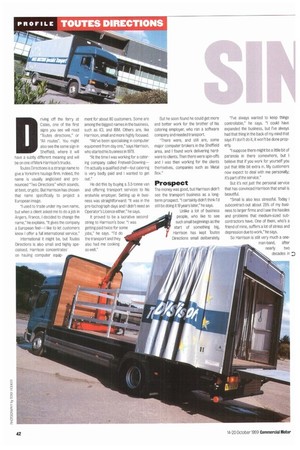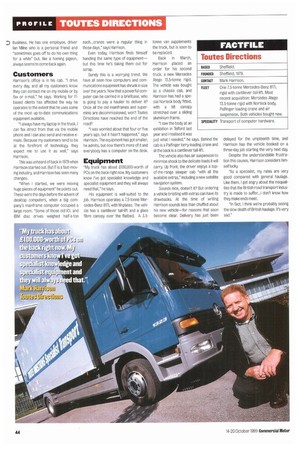riving off the ferry at Calais, one of the first
Page 44

Page 46

If you've noticed an error in this article please click here to report it so we can fix it.
signs you see will read "Toutes directions," or "All routes". You might also see the same sign in Sheffield, where it will have a subtly different meaning and will be or one of Mark Harrison's trucks.
Toutes Directions is a strange name to give a Yorkshire haulage firm. Indeed, the name is usually anglicised and pronounced "Two Directions" which sounds, at best, cryptic. But Harrison has chosen that name specifically to project a European image.
"I used to trade under my own name, but when a dent asked me to do a job in Angers, France, I decided to change the name," he explains. "It gives the company a European feel—I like to let customers know I offer a full international service."
International it might be, but Toutes Directions is also small and highly specialised. Harrison concentrates' on hauling computer equip ment for about 80 customers. Some are among the biggest names in the business, such as ICL and IBM. Others are, like Harrison, small and more highly focused.
"We've been specialising in computer equipment from day one," says Harrison, who started his business in 1979.
"At the time I was working for a catering company called Fretwell-DowningI'm actually a qualified chef—but catering is very badly paid and I wanted to get out."
He did this by buying a 3.5-tonne van and offering transport services to his erstwhile employer. Setting up in business was straightforward: "It was in the pre-tachograph days and I didn't need an Operator's Licence either," he says.
It proved to be a lucrative second string to Harrison's bow: "I was getting paid twice for some jobs," he says. "I'd do the transport and they also had me cooking as well.
But he soon found he could get more and better work for the brother of his catering employer, who ran a software company and needed transport.
"There were, and still are, some major computer brokers in the Sheffield area, and I found work delivering hardware to clients. Then there were spin-offs and I was then working for the clients themselves, companies such as Metal Box."
Prospect
The money was good, but Harrison didn't see the transport business as a longterm prospect. "I certainly didn't think I'd still be doing it 19 years later," he says. Unlike a lot of business people, who like to see such small beginnings as the start of something big, Harrison has kept Toutes Directions small deliberately. "I've always wanted to keep things controllable," he says. "I could have expanded the business, but I've always had that thing in the back of my mind that says if I don't do it, it won't be done properly.
"I suppose there might be a little bit of paranoia in there somewhere, but I believe that if you work for yourself you put that little bit extra in. My customers now expect to deal with me personally; it's part of the service."
But it's not just the personal service that has convinced Harrison that small is beautiful.
"Small is also less stressful. Today I subcontract-out about 25% of my business to larger firms and I see the hassles and problems that medium-sized subcontractors have. One of them, who's a friend of mine, suffers a lot of stress and depression due to work," he says.
So Harrison is still very much a one man-band, after nearly two decades ir
0 business. He has one employee, driver an Milne who is a personal friend and "sometimes goes off to do his own thing for a while" but, like a homing pigeon, always seems to come back again.
Customers
Harrison's office is in his cab. "I drive every day, and all my customers know they can contact me on my mobile or by fax or e-mail." he says. Working for ITbased clients has affected the way he operates to the extent that he uses some of the most up-to-date communications equipment available.
"I always have my laptop in the truck. I can fax direct from that via the mobile phone and I can also send and receive emails. Because my customers tend to be at the forefront of technology, they expect me to use it as well," says Harrison.
This was unheard of back in 1979 when Harrison started out. But IT is a fast-moving industry, and Harrison has seen many changes.
"When I started, we were moving huge pieces of equipment" he points out. These were the days before the advent of desktop computers, when a big company's mainframe computer occupied a large room. "Some of those old ICI and IBM disc drives weighed half-a-ton
each...cranes were a regular thing in those days," says Harrison.
Even today, Harrison finds himself handling the same type of equipment— but this time he's taking them out for scrap.
Surely this is a worrying trend. We have all seen how computers and communications equipment has shrunk in size over the years. Now that a powerful computer can be carried in a briefcase, who is going to pay a haulier to deliver it? Once all the old mainframes and superminis are decommissioned, won't Toutes Directions have reached the end of the road?
"I was worried about that four or five years ago, but it hasn't happened," says Harrison. The equipment has got smaller, he admits, but now there's more of it and everybody has a computer on the desk.
Equipment
"My truck has about £100,000-worth of PCs on the back right now. My customers know I've got specialist knowledge and specialist equipment and they will always need that," he says.
His equipment is well-suited to the job. Harrison operates a 7.5-tonne Mercedes-Benz 817L with M-plates. The vehicle has a cantilever tail-lift and a glass fibre canopy over the flatbed. A 3.5 tonne van supplements the truck, but is soon to be replaced.
Back in March, Harrison placed an order for his second truck, a new Mercedes Atego 13.5-tonne rigid. The vehicle was bought as a chassis cab, and Harrison has had a special Norteck body fitted, with a tilt canopy stretched over a sliding aluminium frame.
"I saw the body at an exhibition in Telford last year and I realised it was just what I needed," he says. Behind the cab is a Palfinger lorry-loading crane and at the back is a cantilever tail-lift.
The vehicle also has air suspension to minimise shock to the delicate loads it will carry Up front, the driver enjoys a topof-the-range sleeper cab "with all the available extras," including a new satellite navigation system.
Sounds nice, doesn't itP But ordering a vehicle bristling with extras can have its drawbacks. At the time of writing Harrison sounds less than chuffed about his new vehicle—for reasons that soon become clear. Delivery has just been delayed for the umpteenth time, and Harrison has the vehicle booked on a three-day job starting the very next day.
Despite the understandable frustration this causes, Harrison considers himserf lucky.
"As a specialist, my rates are very good compared with general haulage. Like them, I get angry about the inequalities that the British road transport industry is made to suffer...I don't know how they make ends meet.
"In fact, I think we're probably seeing the slow death of British haulage. It's very sad."
FACTFILE
Toutes Directions
BASED Sheffield.
FOUNDED Sheffield, 1979, CONTACT Mark Harrison.
FLEET One 7.5-tonne Mercedes-Benz 817L
rigid with cantilever tail-lift. Most recent acquisition: Mercedes Atego 13.5-tonne rigid with Norteck body, Palfinger loading crane and air suspension. Both vehicles bought new.
SPECIALITY Transport of computer hardware.












































































































